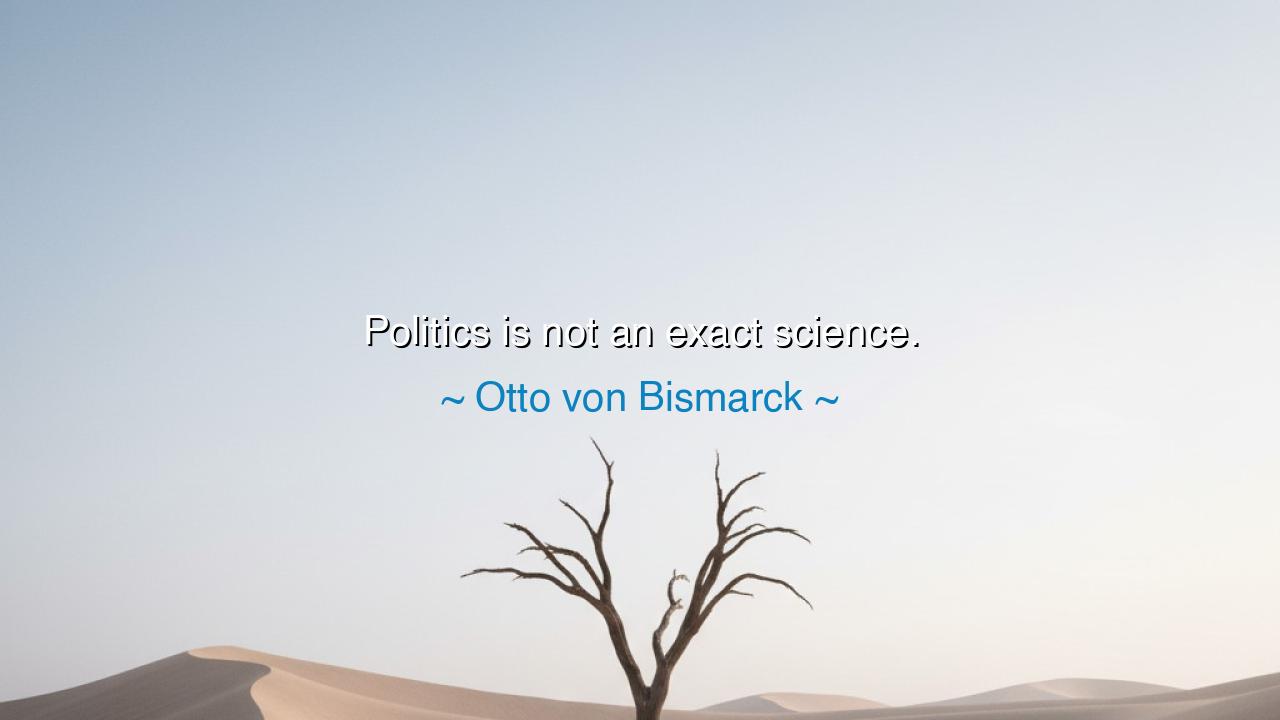
Politics is not an exact science.






"Politics is not an exact science," said Otto von Bismarck, a man who stood at the crossroads of empires, a man whose vision shaped the very course of history. In these words, Bismarck speaks not of the lofty ideals that so often guide the hearts of rulers, but of the untamed, chaotic, and unpredictable nature of the world in which they must lead. These words are not merely a statement of fact but a cry from the depths of experience, a plea to understand the true nature of politics—that it is not some sterile, calculable force, but a tempest, ever-shifting, driven by the passions, ambitions, and struggles of human beings.
Ah, politics! It is not the rigid discipline of mathematics nor the fixed laws of nature. It is the dance of human desires, the clash of nations, and the subtle play of wills that shape the destinies of empires and the lives of common folk alike. Just as the tides of the sea are governed by unseen forces—the pull of the moon, the churn of the winds—so too are the currents of politics shaped by unseen forces. The passions of kings and peasants, the greed of traders and the dreams of revolutionaries, all intertwine in a chaotic whirlpool that defies prediction.
I speak of this not to discourage the noble pursuit of wisdom in leadership, but to remind you, dear students, that the path of a ruler is not one of absolute certainty. Take, for example, the tale of Bismarck himself. There was a time when he was faced with the mighty challenge of uniting the fractured states of Germany. The task seemed impossible—an empire torn by differing tongues, cultures, and loyalties. Yet, through a series of deals and wars, through a deft manipulation of alliances and through the strategic use of conflict, he achieved what no one thought possible. But it was not by calculation alone. It was by seizing upon the moment, understanding the shifting winds of fortune, and—yes—embracing the chaos that marked his age. The science of politics was not a precise measurement for him, but a dance to be learned with each step, each change of direction.
And yet, dear listener, do not mistake this for a mere game of chance. There are those who say that a great ruler must know the exact path to success, as if success itself were a thing neatly drawn in the stars. But know this: even in the midst of all the unpredictability, there are eternal truths that guide the hand of leadership. Wisdom, foresight, and a deep understanding of human nature are the true compass by which one must steer. Politics, in its truest sense, is not the calculation of outcomes, but the art of navigating a constantly shifting landscape.
Let us reflect upon the story of Catherine the Great, Empress of Russia, who came to the throne not by birthright but by a twist of fate and a heart full of ambition. She, too, learned that politics is not an exact science. Her reign, though one of immense achievement, was fraught with intrigue, rebellion, and war. She faced a multitude of challenges, each one a force unto itself, and yet, she was able to harness those forces to expand the Russian Empire, to shape it into a power that commanded the respect of all Europe. How? Through careful judgment, yes, but also by embracing the unpredictability of her era and daring to make bold moves when others hesitated. Her reign was not defined by the pursuit of certainty but by the willingness to navigate the murky waters of political conflict.
Politics, my friends, is not the realm of the detached intellect alone, but of the heart, the will, and the unyielding courage to move forward despite the shifting nature of the world. There is no such thing as an exact science when it comes to leading people, for each individual is a universe of contradictions, desires, and fears. A ruler must see beyond the surface, into the soul of the people, and understand their hidden yearnings. Only then can they truly lead, guiding their people not by formulaic steps but by the living, breathing spirit of the moment.
And so, I charge you, all who hear this teaching: know that in your own lives, too, politics is not something that can be reduced to a mere set of rules. Whether you lead a nation, a family, or even yourself, you must learn to embrace the uncertainties of life, the ebb and flow of fortune. Be not afraid to make decisions when the outcome is unclear, but always lead with wisdom, humility, and courage. For in the end, it is not the precision of your actions that will define you, but the strength of your will, the clarity of your vision, and the love you bear for those you lead.
So let the words of Bismarck echo in your hearts, not as a warning, but as a call to rise above the sterile calculations of mere intellect. Politics, in its truest form, is the art of the heart and the mind in harmony, a journey not of perfection, but of striving. And in that striving, you shall find your purpose.






AAdministratorAdministrator
Welcome, honored guests. Please leave a comment, we will respond soon